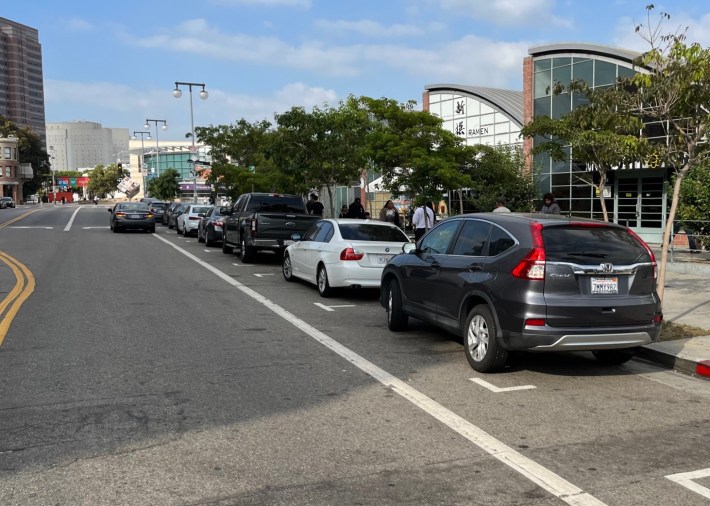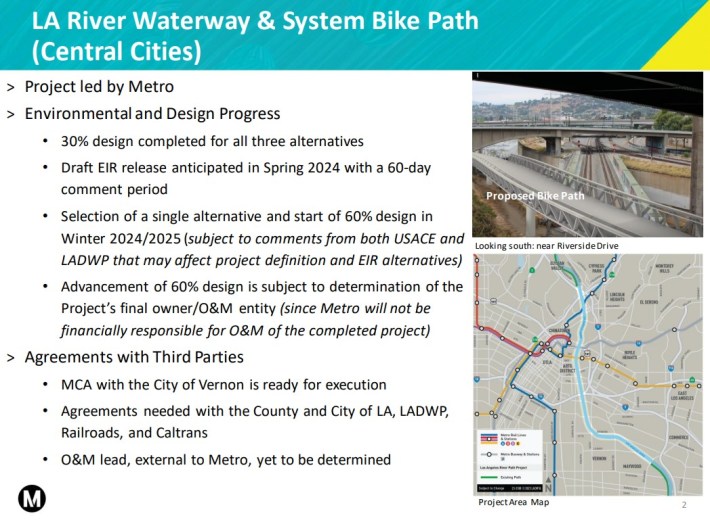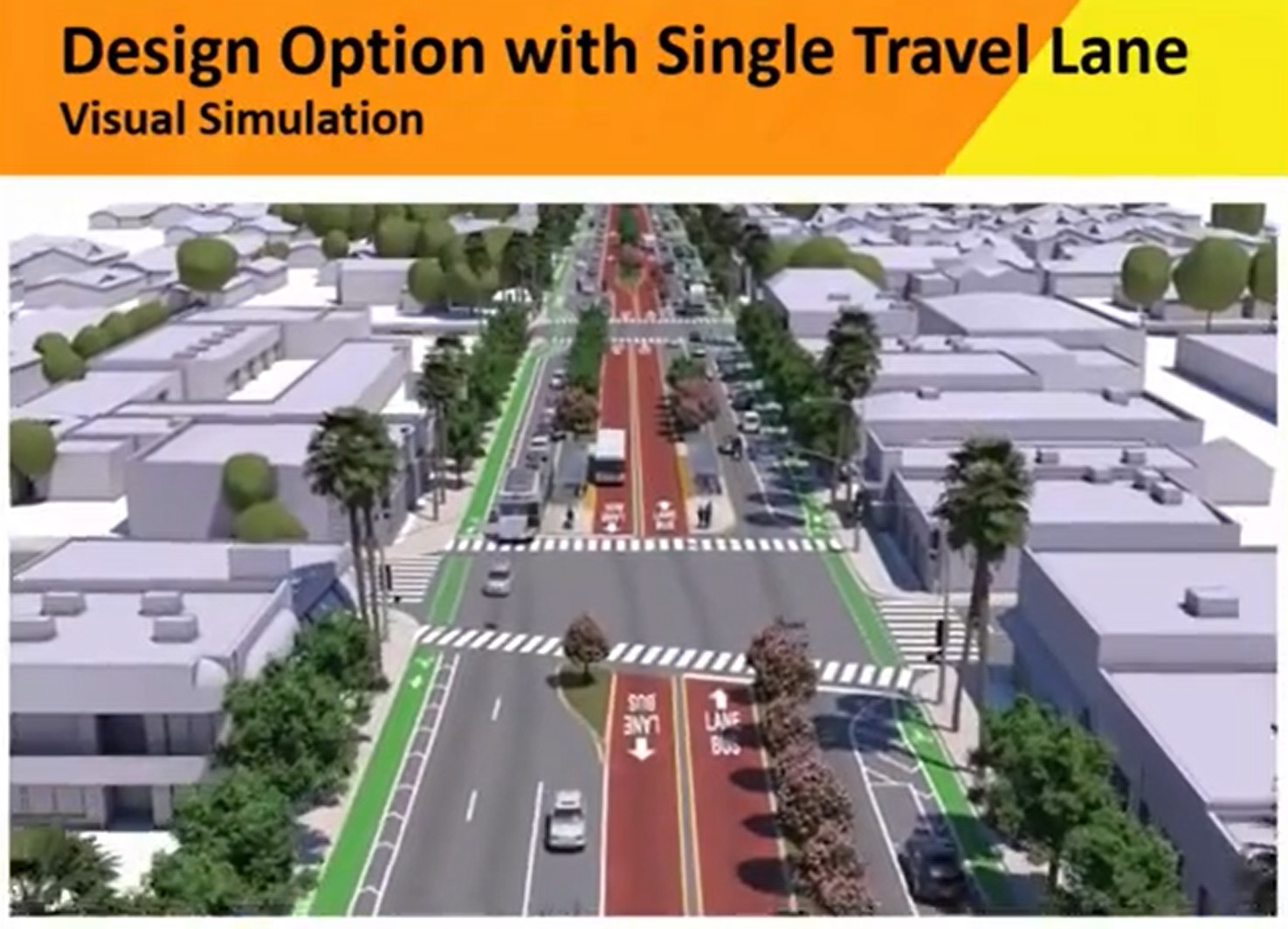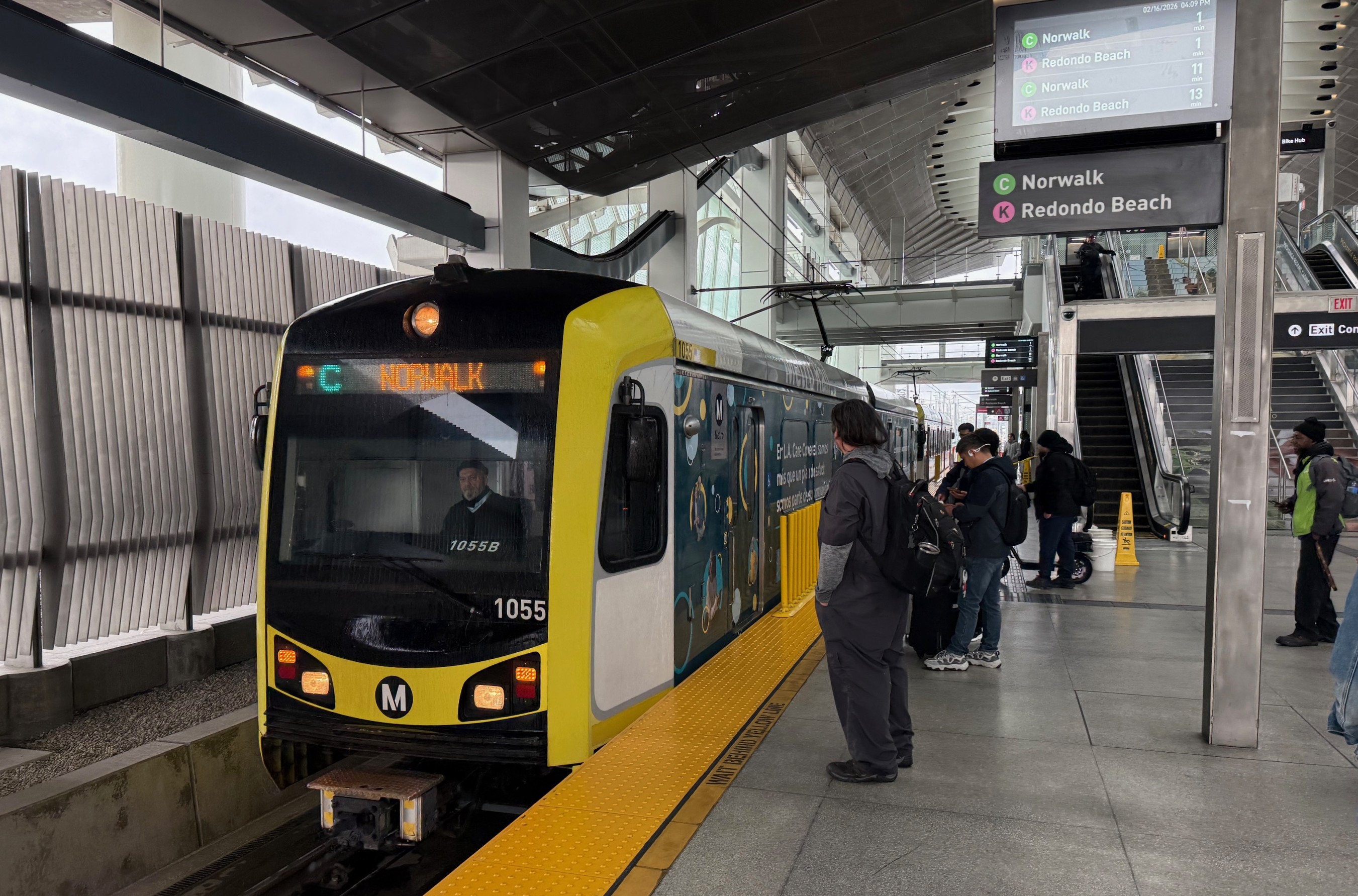2023 may be over, but here's a look back at some pending issues that Streetsblog L.A. hoped might be finished by now.
Downtown Metro Station Bike/Walk Connections
Metro, with sign-off from the L.A. City Transportation Department (LADOT), shortchanged riders walking and biking to newly opened downtown L.A. Metro Regional Connector stations. Contrary to approved street specifications, Metro widened streets to add more car capacity, and omitted approved bike lanes. Instead of following approved plans, Metro chose to follow "engineering designs" that were neither "developed" nor "clearly defined."
Additionally in Little Tokyo, Metro and LADOT radically scaled back federal grant-funded walk and bike improvements in favor of "parking and traffic maintenance priorities."

Mobility advocates pressed Metro to remedy the situation. Metro CEO Stephanie Wiggins responded by alluding to future improvements. "We’d like to do more, so Metro will continue to work with the LADOT and other City departments to identify opportunities for further FLM [first/last mile] and mobility enhancements in the station areas," she stated. But, seven months after the new stations opened, Metro and LADOT have done nothing to remedy these omissions and missteps.
What will it take to get safe bike and pedestrian connections for Metro riders at downtown Metro stations? Maybe the agencies will do something, someday? Or maybe advocates will need to file a lawsuit?
L.A. City Ending Automatic Road Widening
And if Metro is widening streets around downtown stations (where the law says don't do that) what hope is there for other areas (where the law says widen all you can)? Will Metro westside subway construction mean wider and more dangerous streets for Metro's riders?
You bet. Unless...
There's an effort afoot to end harmful road widening. L.A. City Councilmembers Nithya Raman, Bob Blumenfield, and former Councilmember Mike Bonin authored a motion that ends the practice. The motion sailed through committee hearings and was approved by the full City Council back in early March 2023.
Unfortunately, it's a two-step process. The council tells city staff to write a new law, then the actual ordinance text comes back to the council for final approval before it takes effect. The motion directed city staff to prepare an ordinance in 60 days, which would have meant approval around mid-2023.
Then nothing happened.
If there's any hope for Metro (and basically any halfway large-scale construction) to stop making streets wider and wider and more and more dangerous, the council needs to get this ordinance approved. Yesterday.
City Council's Version of Healthy Streets L.A.
Think back to August 2022. The city council was facing a ballot initiative, Healthy Streets L.A., which would automatically implement bus, bike, walk, and safety improvements during repaving. (More on Healthy Streets L.A. - now "Measure HLA" - below.) Then-Council-President Nury Martinez pledged that, instead of Heathy Streets L.A., the city would develop its own "Safe Streets" ordinance which would include equity-focused implementation of the Mobility Plan. Most of the council opined at length on the importance and urgency of the city implementing safety improvements.
Martinez pledged that city staff would respond "within the next few weeks" because "for equity, for safety, and for climate - this coming crisis that we're facing - we must implement this Mobility Plan."
(Two months later, Martinez resigned, embroiled in scandal.)
For a year, nothing happened on Safe Streets. (In fact, several city departments did the opposite, going on the offensive to undermine the legitimacy of the city's own Mobility Plan.)
In August 2023, city staff posted a weakened, problematic draft ordinance (read Streets for All's critique). The council never scheduled any public hearing which could have received public input and maybe fixed problems, thus strengthening the draft ordinance.
What seemed like the council's urgent attempt to advance equity and safer streets turned out to be vaporware at best - or deception designed to split advocates at worst.
Now it's 2024. In just two months, L.A. City voters will decide Measure HLA in the March 5 election. City departments are continuing their push to undermine Measure HLA, the Mobility Plan, and walking, bicycling, and transit in general (see for example Little Tokyo above).
Despite those efforts, Measure HLA continues to gain momentum, picking up endorsements, raising funds, and recruiting volunteers. Get involved via the campaign website.
The Council futzed around with its Safe Streets ordinance for a year and a half, and it still looks a lot less than half-baked. HLA can't come soon enough.
Metro Transit, Walk, Bike Projects Delayed and Stalled
Voters approved Metro's transportation sales tax, Measure M, in 2016. Measure M includes an expenditure plan, which is basically a long list of projects with scheduled dates.
Metro has been hustling to accelerate project construction ahead of the voter-approved Measure M schedule - but only for freeway expansion projects. In Measure M, Metro's half-billion-dollar 57/60 expansion was scheduled to break ground in Fiscal Year 2025. Metro pulled out the stops and started construction in May 2023.
But what about all those Metro Measure M green transportation projects? Has Metro accelerated any of them?
Nope.
Below is a list of some projects that have passed their Measure M scheduled date. [Most project schedule information below is from this December 2023 Metro presentation.]
- High Desert Multi-Purpose Corridor - property acquisition scheduled for 2019. Metro lost interest in getting this project underway when the freeway component was canceled, effectively making it a high-speed rail project. There is some grant-funded planning underway, and the project looks more important with recent federal funds going to connected high-speed rail at both ends. But Metro is sitting on $170 million that they probably should have started spending years ago.
- Orange (G) Line Bus Rapid Transit (BRT) Improvements - groundbreaking scheduled for 2019. Metro has started pre-construction, but is experimenting with a "Progressive Design Build Contract" construction model that has meant iterative scaling back of the project scope ("value engineering and cost reduction measures") due to escalating construction costs. Theoretically, the $286 million project, which was to include bikeway enhancements, might still open in its scheduled 2025-2028 window, but only if Metro prioritizes getting construction underway soon.
- North Hollywood to Pasadena BRT - groundbreaking scheduled for 2020. Metro did its best to hold endless meetings while Eagle Rock NIMBYs went loudly ballistic against these bus improvements (while the cities of Glendale, Burbank, and Pasadena - in deference to drivers - quietly scaled back their portions of the project). Metro finally put the project out to bid in mid-2023, so the groundbreaking is four years late (assuming it happens soon). Measure M's 2022-2025 opening date won't happen; Metro now expects bus riders could see improvements Summer 2027. Project also includes bike and walk upgrades... someday!
- North San Fernando Valley BRT Improvements - groundbreaking scheduled for 2019. Valley NIMBYs defeated Measure M voters on this one. Metro is not doing full BRT, only basic bus improvements, mostly bus lanes and bus shelters. Some construction should get underway next year, with Metro projecting completion in Summer 2026, after the Measure M 2023-2025 scheduled opening date.
- L.A. River Bike/Walk Path - groundbreaking scheduled for Fiscal Year 2023. Metro is slow-walking its $365 million river path project through downtown L.A. and Vernon, because Metro doesn't want to maintain the facility it promised to Measure M voters. Metro expects to release the project EIR (Environmental Impact Report) next Spring, with no anticipated schedule for groundbreaking or opening. Maybe cyclists should ride on those widened freeways instead.

The above list points to a pernicious double standard at Metro (one that SBLA has pointed out before). When it comes to freeway expansion, Metro staff and board are quick to insist that "we have to do this because it's what the voters approved." When it comes to transit (operations and capital), BRT, bike paths, etc., Metro is fine with delays, years of meetings, and scaling back and canceling projects - whether the voters like it or not.
If only Metro would act with the same urgency on equitable healthy modes - as it does for highway widening - but don't hold your breath.
These delays are not all Metro's fault. Federal and state funding streams are designed to funnel infrastructure funding into freeway expansion (and maintenance). Freeway projects get dollars, while transit and active transportation scrape together pennies.







